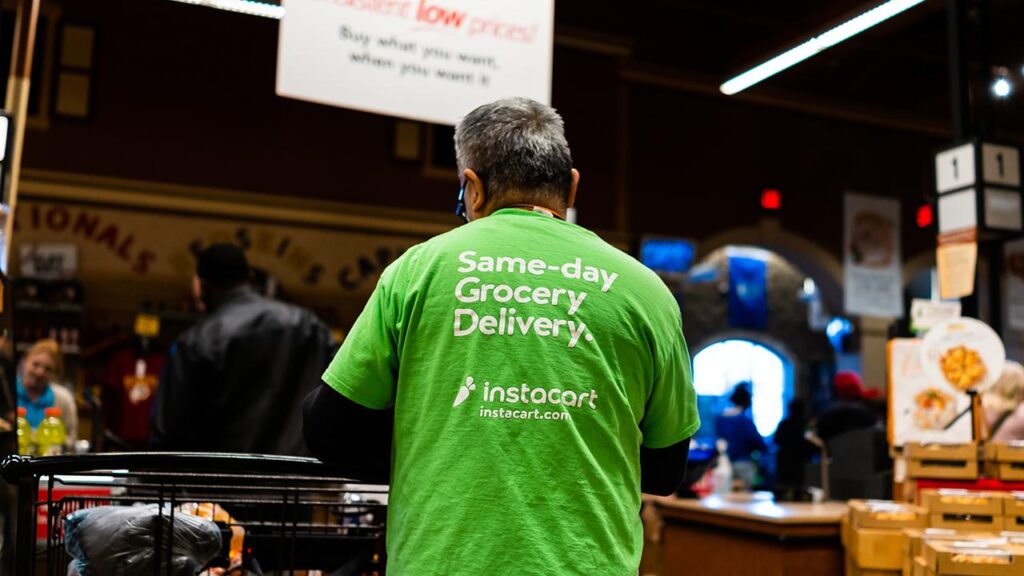Instacart Opposes New York’s Minimum Wage Legislation for Grocery Delivery Drivers
Instacart has initiated a robust campaign against New York City’s proposed law that would enforce a minimum wage for grocery delivery drivers. The company contends that this legislation threatens the flexibility inherent in the gig economy model and jeopardizes the income of thousands of independent contractors who currently earn based on tips and order volume. Instacart has publicly declared its intention to pursue legal action if Mayor Eric Adams signs the bill into law, arguing that the legislation conflicts with federal labor classifications and would significantly increase operational expenses.
This dispute underscores a broader conflict between advocates pushing for enhanced worker protections and gig economy companies defending their innovative compensation frameworks. Instacart’s position favors a pay system driven by incentives and performance rather than fixed hourly wages. Critics argue that this approach prioritizes corporate profits over equitable treatment of workers, especially as nationwide momentum builds for regulating gig labor. The outcome of this conflict could influence similar platforms contemplating policy changes or expansion in New York and other jurisdictions.
- Legislation Goal: Establish minimum hourly earnings for grocery delivery workers
- Instacart’s Position: Legislation disrupts gig economy flexibility and contractor autonomy
- Possible Consequences: Legal disputes, policy amendments, effects on worker income
| Issue | Instacart’s Perspective | Labor Advocates’ Perspective |
|---|---|---|
| Worker Status | Classified as independent contractors | Should be granted employee protections |
| Compensation Model | Based on performance incentives | Requires guaranteed minimum wage |
| Business Impact | Higher costs and reduced operational flexibility | Ensures fair pay and job security |
Impending Legal Conflict Over Worker Protection Bill in New York
Instacart’s firm opposition to New York City’s Worker Protection Bill signals an imminent legal confrontation. The bill aims to set a minimum wage floor for grocery delivery drivers, a move that Instacart executives argue would disrupt their business operations and substantially increase costs. In a formal letter to Mayor Eric Adams, Instacart warned that enacting the bill would provoke immediate litigation challenging the city’s authority and the bill’s legality.
The company’s resistance reflects wider tensions within the gig economy, where labor advocates seek stronger safeguards. Key provisions of the bill that Instacart contests include:
- Mandatory minimum hourly pay for gig workers, independent of tips or bonuses
- Requirements for transparent wage calculations and earnings disclosures
- Improved processes for workers to contest pay discrepancies
- Expanded enforcement powers for the city’s labor department
| Stakeholder | Position | Potential Result |
|---|---|---|
| Instacart | Opposes minimum wage; threatens lawsuit | Possible injunction blocking bill’s implementation |
| Mayor Eric Adams | Supports worker wage protections | Potential enactment of minimum wage law |
| Worker Advocacy Groups | Endorse bill for fair compensation | Enhanced labor rights and pay transparency |
Examining the Effects of Minimum Wage Legislation on Gig Delivery Workers
As momentum builds for legislation guaranteeing minimum pay for gig economy delivery drivers, companies like Instacart face mounting challenges. The proposed law aims to secure a stable income floor for grocery delivery workers, addressing concerns over rising living costs and income volatility. Instacart, however, argues that such mandates could undermine its business model and potentially reduce job opportunities for drivers. The company’s threat of legal action if Mayor Adams signs the bill highlights the contentious nature of this debate.
Industry experts suggest that the resolution of this conflict could reshape the gig economy’s labor landscape. Proponents emphasize the importance of economic stability and dignity for a workforce often lacking traditional employment benefits. Conversely, opponents stress the value of flexibility and scalability, which they claim are vital for innovation and service delivery. Central issues under discussion include:
- Income consistency: How guaranteed wages might influence driver recruitment and retention
- Cost implications: Potential increases in operational expenses affecting consumer prices
- Legal ramifications: Setting precedents for gig economy regulation nationwide
| Factor | Supporters’ Viewpoint | Opponents’ Viewpoint |
|---|---|---|
| Driver Earnings | Guarantees fair and predictable pay | Could limit flexible earning potential |
| Service Coverage | Encourages a sustainable workforce | May lead to reduced service areas |
| Legal Impact | Establishes worker protection standards | Risks costly and prolonged litigation |
Strategies for Harmonizing Business Needs with Fair Worker Pay
Achieving a sustainable equilibrium between corporate profitability and equitable compensation for gig workers requires a nuanced approach. Policymakers might consider implementing graduated wage standards that adjust minimum pay based on company size and revenue, thereby protecting smaller businesses from undue financial strain while ensuring larger firms maintain fair pay practices. Enhancing transparency through mandatory earnings reporting can also empower workers and regulators by providing clear insights into income distribution and disparities, fostering data-driven policy decisions.
In addition to wage reforms, establishing worker support initiatives through public-private partnerships could alleviate corporate resistance. Recommended measures include:
- Shared healthcare subsidies between companies and government to reduce benefit costs
- Investment in skill development programs funded by a portion of delivery fees to promote career advancement and retention
- Dedicated dispute resolution systems tailored for gig workers to address compensation issues efficiently
| Policy Component | Objective | Anticipated Benefit |
|---|---|---|
| Graduated Wage Standards | Adjust pay requirements by company scale | Ensures fair wages without burdening small businesses |
| Earnings Transparency | Public disclosure of income data | Supports informed policymaking and equitable negotiations |
| Worker Support Programs | Shared benefits and training investments | Improves worker stability and skill development |
Conclusion
The intensifying debate over fair compensation for gig economy workers has positioned Instacart at the forefront of a contentious legal and policy battle. With the company prepared to challenge New York City’s proposed minimum wage legislation, the future of grocery delivery worker pay remains uncertain. The mayor’s forthcoming decision will not only impact thousands of drivers but could also establish a critical precedent for labor rights within the expanding gig economy nationwide.













